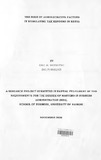| dc.description.abstract | The Kenyan law as relates to tax has been deemed complex in terms of the
understanding of what needs to be incorporated in the computation of tax to
be paid and what should not be part of the tax bracket. As such, the
complexity of the corporate tax system may be the reason for low compliance
levels in Kenya. The compliance problem has meant that the Government
collects far less than it needs to yet projects that are to be funded by the
Government continue to escalate. The tax reforms therefore come in handy to
remedy the situation for corporate tax payers. It is in this light that the study
seeks to examine the role of tax complexity, enforcement and compliance in
tax reforms in Kenya. The study sought to establish the role of tax
complexity, compliance and enforcement in tax system reforms in Kenya.
This study used a descriptive survey. The population of interest in this study
consisted of all the 350 tax managers within the Kenya revenue Authority
who deal with or advice on tax reforms issues and the financial managers in
the 55 companies listed. The financial managers deal with tax issues hence
their consideration in this study. Three managers within Nairobi formed the
sample size that filled in the questionnaire for the tax managers at KRA. A
sample of 35 financial managers was selected for the study using simple
random sampling. Primary data was collected from the respondents using two
sets of questionnaires. The primary data collected was analyzed based on
descriptive statistics such as percentages. Results were presented using
tables and graphs, and pie charts for effective interpretation by users.
The study found that tax compliance, tax complexity, and enforcement play
major roles in influencing tax system reform in a country. As the study found
out, low levels of compliance earlier on led to more reforms to ensure that
compliance percentages. increase. Ever since the introduction of new
measures at the KRA, compliance levels have been rising. These points to the fact that compliance levels significantly influence tax system reforms. Low
levels of compliance earlier on led to more reforms to ensure that compliance
percentages role. Further, the reforms that were earlier on carried out in the
tax system were meant to make more taxpayers comply. The problem was due
to lack of stringent enforcement procedures that saw many escape the traps.
With the new political reality, enforcement has been beefed up and this has
seen KRA surpass even its revenue collection targets. Thus, enforcement
plays a major role in tax reforms. The study recommends that for any
meaningful tax reforms to take place in Kenya, the role of administrative
factors such as enforcement, compliance and tax complexity should be
considered. The administrative factors are an important ingredient III
realizing the objectives of tax reforms. | en |

